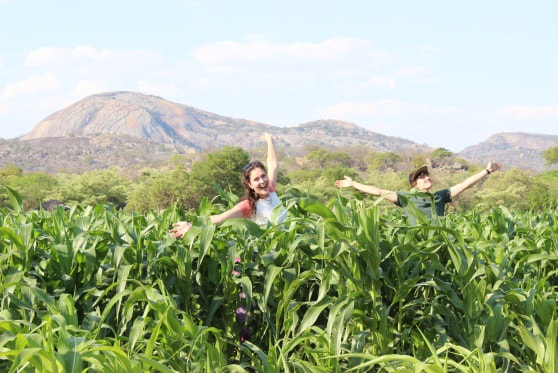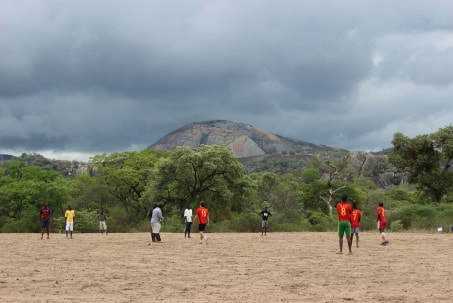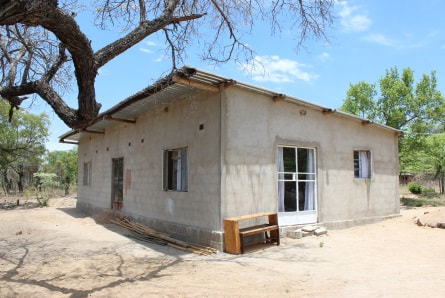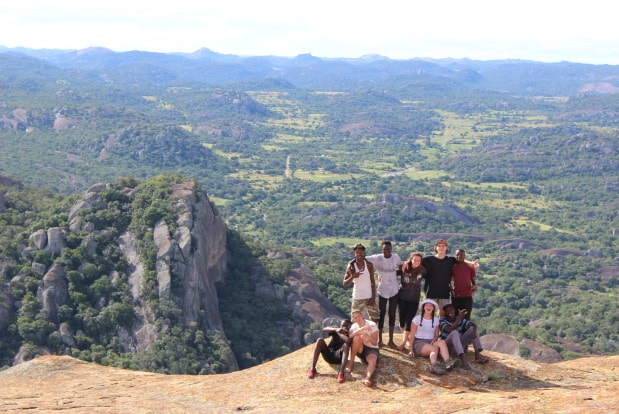travel bursary reports
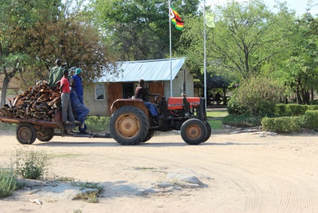 BMS World Mission is a Christian mission organisation, working in around 35 countries on four continents. They aim to share life in all its fullness with the world’s people by: enabling them to know Christ, alleviating suffering and injustice and improving the quality of life. This is done through many different programmes and projects. I took part in Action Teams which is a gap year programme for 17 – 23 year olds to serve God around the world. It is made up of one month training, six months overseas and two months UK mission tour. Training began in September and consisted of morning bible study and prayers, team building activities, cultural training, a trip to an outdoor activity centre, public speaking training and first aid training. I lived with the rest of the action teamers in the International Mission Centre (IMC) in Birmingham and it was a great opportunity to get to know other young Christians from around the UK. It is at training where I met the rest of the team I would be going to Zimbabwe with; and it is a chance to get to know each other and become accountable to one another before heading overseas into a new culture and country. My team consisted of another girl called Maisie, and two boys; Olly and Tom and of course myself. In October we flew over to Zimbabwe and began our six months overseas mission placement. We were mainly based as a team in the Matopos near Matobo National Park; it was a beautiful area and was home to some of the most amazing wildlife. We were lucky enough to see Rhino and we found out that the dam we swam in had a crocodile living in it! Our main project was at a farm called Ebenezer Agricultural Training Centre which aims to equip young people for a life with Christ and aims to send those young people out to be the hands and feet of Christ in their communities. At the farm there are apprentices who are young people from across Zimbabwe who have come to live, learn and farm at Ebenezer. As a volunteer at the farm my role was to get alongside the apprentices and help equip them for a life with Christ. 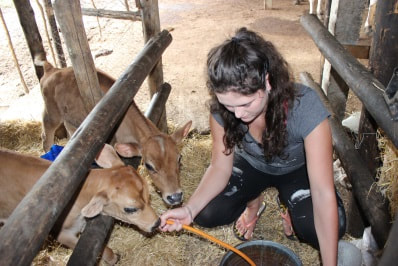 To do this our daily routine would consist of first waking up at 5 o’clock in the morning and heading to the dairy to help with milking the cows and feeding the calves (I have never worked on a farm before so it’s fair to say it was quite an experience – I will add I am basically pro now!). I spent those two hours in the morning with a young woman; Jane2 who was 22 years old and a young man; Max2 who was also 22 years old. They taught me everything I now know about keeping a dairy, we also became great friends and still message via WhatsApp. I spent a lot of time with Jane throughout the six months in Zimbabwe and one of my favourite memories is sitting by the silage pits roasting maize on a fire talking about our futures and what that might hold for each of us. Once a week after the morning farm work there would be a meeting for all the staff and volunteers on the farm; we met and read the bible together and prayed for the farm and the apprentices – it was a great time of community for all the staff and volunteers to get together and remind us of our reasons for being at the farm and keeping a focus on God even during the more stressful times. At 9 o’clock the apprentices would have a Bible Lesson where they would read a passage and discuss the issues raised from it, as volunteers we were there to help answer any questions anyone had about the passage and what that means for us as Christians. This was an opportunity for us to share our views and to help the apprentices think about the issues to come up with their own opinions and how they think that affects their faith. Then at 11 o’clock the apprentices had maths and English lessons; due to the differing backgrounds of the apprentices the maths and English levels ranged from primary school to O-Level standard, some could speak fluent English and some couldn’t speak it all. Olly, Tom, Maisie and I each had a different levelled class for maths and English. I taught the highest set maths which had 6 apprentices in it; I loved teaching to a small group because it meant I could focus on things they found difficult and help them to improve those skills, it also meant I could get to know those 6 people very well and build up a relationship with them. Jane was also one of those 6; she was hoping to do her O-Level this summer so I helped her with extra maths lessons for that as well. My English class was much bigger and so it was harder to give each apprentice any 1-to-1 time. But through reading simple books, speaking and writing practice their English definitely improved over the six months we were there. The apprentices were amazing students to teach as they were keen to learn and so it was a privilege to teach them (although like any class there were always one or two who never did their homework)! After lunch I would help feed the calves again and then as a team we would find any odd jobs that needed to be done around the farm. We painted the girls rooms and made hooks for their coats or clothes; we also re-vamped the putt putt (mini-golf) course and did a lot of cleaning up the farm. Our aim was to make the farm a nicer place to be living on for everyone because this tended to not be on the farms budget priority list as they had more important things to spend their money on, e.g. animal feed. At 5 o’clock it was club time, everyone who was working in the fields finished their work and so if they wanted to they could join in with clubs every evening. I ran a netball club for the girls as we were lucky enough to have netball posts at the farm; other clubs that were run were football, guitar lessons and drama club. These were a further chance to develop deeper relationships with the apprentices and to offer our own skills and passions to the farm, it was completely unpressurised and so genuine friendships could grow more easily. Sport was also a way for the farm to be in community with the surrounding areas in the Matopos. Young and old would come to Ebenezer for a day of netball and football tournaments, finishing off with a meal together in the dining hall. Around 500 people would attend and be there and so it helped us to get involved with the community and to be part of the Matopos family. Finally we would head into bed at 9 o’clock to get some rest before the next busy day! 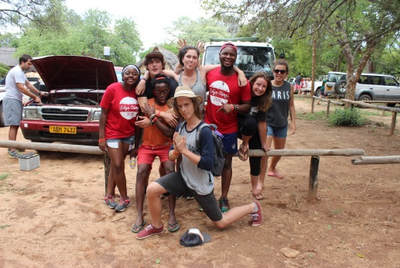 Ebenezer farm was our main project but we also did a couple of other things during our six months overseas. The first were summer camps or end of school camps which were 5 days long at an activity centre called Shalom Campsite which was in the African bush. Shalom had a waterslide, a zip line, abseiling sessions, low ropes course, paintballing and the use of the dam. We used the dam wall for jumping into the dam and for getting pulled around the dam on a surfboard by a speed boat. These activities took up most of the day at the camps and we would help to lead those activities as well as joining in with them. But we also had morning seminar sessions and afternoon reflective time to try and bring the gospel to these youngsters; it was like an African small-scale style Soul Survivor. Being a mentor on these camps was challenging for me personally because I didn’t think the reason for me going to Zimbabwe was to work on camps with more privileged children but rather to help improve the quality of life for those who aren’t privileged. However something I learnt when talking to home about these struggles was that those privileged children would most likely be the ones who would go into positions of authority, e.g. in government and so would be the ones who could make changes to their country. By having a strong Christian faith from a young age they then could take that into their job in the future and perhaps bring about change. I also realised that everyone needs to hear the gospel not just the marginalised and underprivileged and not just the privileged but everyone. As an adrenalin junkie these camps were naturally a lot of fun, the other leaders were also like-minded people who wanted to share the gospel and the camps were a place to get to know them as well. After meeting them at a particular camp called Edge Camp we started to hang around with them on our days off in Bulawayo; playing games, climbing, picnics or just getting together to chill around a pool. They made my experience in Zimbabwe so much fun and encouraged me when times were more difficult. The other project we got involved with was a school for street children; children who could not afford to be in education and so have missed a lot of school. The school helps them to catch up and then pays for them to go back to school when they reach a suitable level, but it also keeps the children who have missed so much school that they can’t go back to mainstream education and gives them the best chance at getting a job in the future. An amazing story about one of the young lads, Simon2, he missed 7 years of school but through his hard work and the teacher’s dedication he managed to get accepted into a private school by passing an entrance exam and a donor offering to pay for him. I helped some of the students with their maths on a 1-to-1 basis and to help them with their personal struggles. We were made to feel like part of the schools family even though we only helped out for two weeks and it was very sad leaving the school on our last day there.
We left Zimbabwe at the end of March and flew home. When we were back in England we headed back to the IMC for two weeks of debrief and tour training. Those two weeks were also a great chance to meet the other teams again and catch up on our overseas experiences with each other. For the next 8 weeks we travelled around the UK to different churches sharing our experiences with youth groups, events, school classes, old people groups and house groups. Those 8 weeks were particularly tough but they enabled me to become a more confident public speaker and improve my communication skills. This year finished on the 1st July with a closing service in Birmingham which every team and their families and friends could attend. It marked the end of a challenging but incredible year. No-one ever said mission was easy and that certainly was not my experience of it but it enabled my growth: a deeper faith, a deeper love for people, in patience and resilience. I learnt and continue to learn the joy in the hardships of mission and the individual struggles that brought to me. Despite these struggles these past 10 months have been a blast: I have met some life-long friends, experienced another culture and country in all its devastation and beauty, learnt a little Ndebele, ate some weird and wonderful foods, saw God’s creation in its finest hour at Victoria Falls and Hwange National Park and created memories that will last a lifetime.
0 Comments
Your comment will be posted after it is approved.
Leave a Reply. |
Reports
Read our reports from those we have supported through bursaries! Archives
August 2023
Categories
All
|
